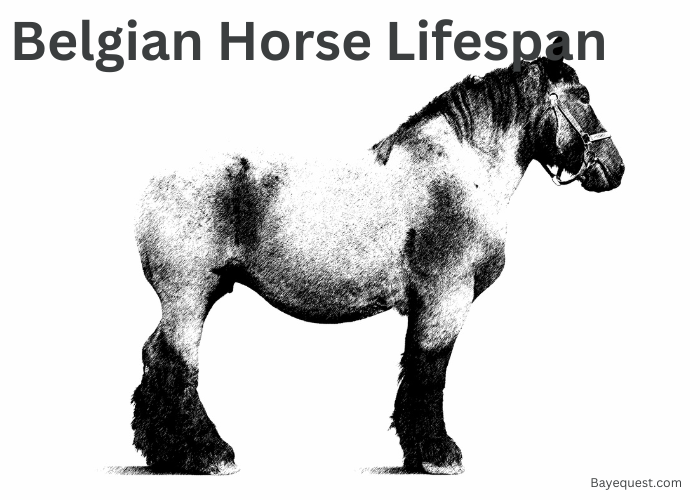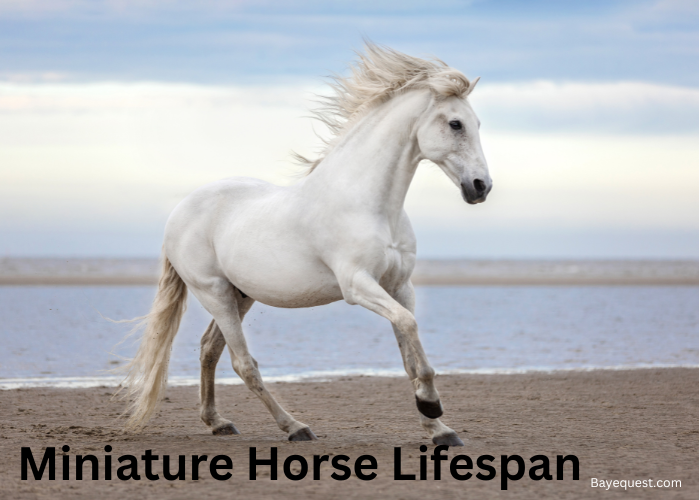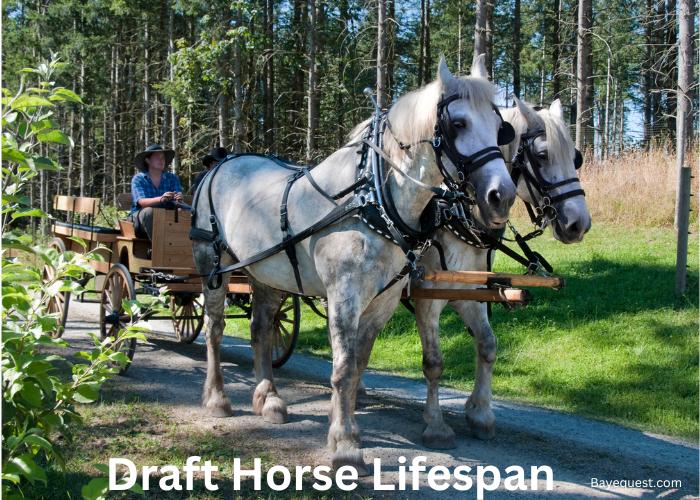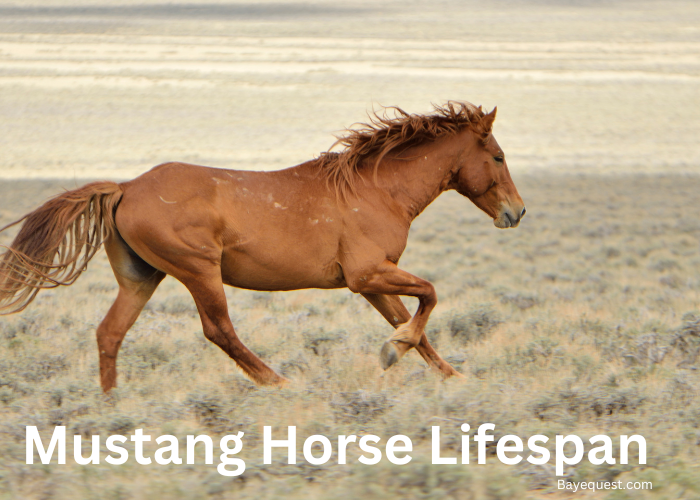The Belgian horse is a marvel of strength and grace. Towering in size yet gentle at heart, these giants have served humans for centuries, pulling, plowing, and powering through the toughest tasks.
But their journey isn’t just about work; it’s about endurance, care, and the passage of time.
What determines how long they thrive? Is it their build, their diet, or something more?
Understanding their lifespan isn’t just about numbers. It’s about unlocking the secrets to their health, vitality, and longevity.
Want to know how to help your Belgian horse live a long, healthy life? Keep reading to discover the secrets behind their lifespan.
What is the Average Belgian Horse Lifespan? Key Takeaway
The average lifespan of a Belgian horse is 17 to 22 years. With proper care, they can remain strong and healthy into their senior years. Regular veterinary visits, a balanced diet, and moderate exercise are key to helping Belgian horses live long and healthy lives.
What is a Belgian Horse?
A Belgian horse, also known as the Belgian Draft Horse, is a large and powerful draft breed from Belgium. These horses have immense strength, a calm temperament, and a willingness to work.
Their muscular bodies, broad chests, and strong legs make them ideal for heavy labor such as farming, logging, and pulling carriages.
Belgian horses are typically chestnut or sorrel in color, with a flaxen mane and tail. Despite their massive size, they are gentle, intelligent, and easy to handle.
Origin and History of the Belgian Horse
The Belgian horse comes from Belgium, specifically the Brabant region. It descends from the Great Flemish Horse, a large medieval warhorse.
These horses carried armored knights into battle. They were known for their strength, endurance, and power.
As warfare changed, their role shifted. They became farm and workhorses, used for plowing fields, pulling carts, and hauling heavy loads.
Their strength made them essential for agriculture and industry.
In 1886, Belgium officially recognized the breed. Soon after, Belgian horses were exported worldwide.
Farmers and workers valued them for their calm nature and incredible pulling power. In the United States, they became one of the most popular draft horse breeds.
Over time, machines replaced horses in farming and industry.
However, Belgian horses are still widely used today. They compete in pulling contests, work on small farms, and even participate in parades and exhibitions.
Their history is one of transformation, from warhorses to farm workers to modern-day companions.
Despite their massive size, they are gentle, hardworking, and loyal. Their legacy continues, proving that strength and kindness can go hand in hand.
Characteristics of the Belgian Horse
Here are the characteristics of Belgian horses:
Size and build
The Belgian horse is massive in size and has a strong build. It has a broad chest, sturdy shoulders, and a well-muscled body that allows it to carry out heavy tasks.
Its strong frame is built to endure long hours of hard work, making it one of the most powerful draft horses in the world.
Weight
Belgian horses weigh between 1,800 and 2,200 pounds. Their large size contributes to their incredible strength, allowing them to pull heavy loads with ease.
However, managing their weight is crucial to maintaining their health, as excess weight can lead to joint and metabolic issues.
Height
Belgian horses stand between 16 and 18 hands tall (64 to 72 inches at the shoulder), with some individuals even reaching up to 19 hands.
Their height, combined with their muscular frame, makes them incredibly powerful. This towering stature is one of the breed’s defining features.
Appearance
The appearance of a Belgian horse is striking. They have a well-proportioned head, large kind eyes, and a thick, flowing mane and tail.
Their strong neck and broad back enhance their commanding presence. Despite their large size, their friendly expression makes them appear approachable and gentle.
Leg structure
The Belgian horse’s leg structure is built for strength and stability. Their legs are thick and sturdy, with well-defined joints and large hooves that provide excellent support for their weight.
Their strong legs allow them to carry heavy loads and work for long periods without becoming fatigued.
Color
The most common color of a Belgian horse is chestnut or sorrel, often accompanied by a flaxen mane and tail. Though less common, some may also have bay, roan, or dun coats.
Their thick coats help protect them from harsh weather, making them well-suited for outdoor work and changing climates.
Strength
One of the Belgian horse’s most impressive traits is its strength. They are powerful and capable of pulling loads many times their own body weight.
This strength makes them ideal for labor-intensive tasks like plowing, logging, and competitive pulling events.
Hardiness
Belgian horses are known for their hardiness. They adapt well to various climates and tough working conditions, whether on farms, in forests, or in the fields.
Their resilience means they can endure long hours of hard work and recover quickly, provided they are properly cared for.
Stamina and endurance
In addition to strength, Belgian horses possess remarkable stamina and endurance.
They can sustain physical effort for extended periods without excessive fatigue, making them ideal for jobs requiring continuous work.
Their ability to work for long stretches sets them apart from other draft breeds.
Emotions
Belgian horses are gentle and affectionate. Despite their large size, they are calm and friendly, forming strong bonds with their handlers.
They enjoy human interaction and tend to stay composed in busy or stressful environments.
Temperament
One of a Belgian horse’s best qualities is its temperament. These horses are calm, cooperative, and easy to train.
They are known for their willingness to work and are often eager to please their owners.
This makes them great companions for both experienced horse owners and those new to handling horses.
Belgian Horse Lifespan: How Long Do Belgian Horses Live?
The Belgian horse lives for about 17 to 22 years. With proper care, it can enjoy a long life and remain strong and hardworking into its senior years.
However, age can bring challenges, like joint problems or metabolic issues. Regular vet visits and a good diet help them stay healthy.
Despite their size, Belgian horses are known for their stamina and endurance. They make loyal companions throughout their lives.
Related read: Draft Horse Lifespan.
Factors Affecting the Lifespan of a Belgian Horse
Health care
Health care is key to a Belgian horse’s lifespan. Regular vet visits help catch problems early.
Belgian horses can get joint pain, lameness, or metabolic disorders as they age.
If treated early, these issues can be managed. Without care, they can worsen and shorten the horse’s life.
Diet
A healthy diet is vital for Belgian horses. They need balanced meals to maintain a healthy weight.
Too much weight puts pressure on their joints. This can lead to arthritis or other issues.
A good diet keeps them strong and avoids weight-related health problems.
Exercise
Exercise is important for Belgian horses. Regular, moderate exercise helps keep their muscles strong and prevents obesity.
However, too much exercise can cause injuries. The right amount of exercise helps the horse stay fit and live longer.
Living environment
The right living environment also affects a Belgian horse’s lifespan. Horses need a clean, safe place to live.
A good shelter protects them from harsh weather. Horses in poor conditions are more likely to get sick.
A safe, comfortable space helps them live a long life.
Genetics and lineage
Genetics refers to the inherited traits that are passed down from a horse’s parents. These traits can affect its health, strength, and overall well-being.
Good genetics can mean fewer health issues, a stronger immune system, and better physical performance for Belgian horses.
Lineage refers to a horse’s family history or ancestry. Horses with strong lineage are often healthier and have fewer genetic issues.
Good breeding practices focus on selecting horses from strong lineages with fewer hereditary health problems. This can increase the chances of a longer, healthier life for the offspring.
In short, the genetics and lineage of a Belgian horse play a significant role in its health and lifespan. A horse from a good lineage with strong genes is more likely to live longer and stay healthy.
Tips for Increasing the Lifespan of Your Belgian Horse
Taking care of your Belgian horse is key to helping it live a long and healthy life. Here are some tips that can make a big difference:
Regular vet check-ups
Regular vet visits are important. These check-ups can catch health problems early before they become serious.
Make sure your horse gets vaccinations, dental care, and hoof care. The vet can also check for joint issues, which are common in Belgian horses.
Early treatment can help your horse live longer.
Balanced diet
Feed your horse a well-balanced diet. Belgian horses are large, so they need enough food to keep them strong but not overweight.
Provide quality hay, fresh water, and the right amount of grains. Consult a vet or nutritionist to ensure the diet fits your horse’s needs.
Proper exercise
Give your horse the right amount of exercise. Belgian horses need regular exercise to stay fit, but it shouldn’t be too intense.
Moderate activity helps maintain muscle strength and keeps the weight in check. Overworking can lead to injuries, so make sure to give your horse time to rest.
Comfortable living space
Provide a clean and safe living space. Make sure your Belgian horse has a large, comfortable stall or pasture.
They need enough room to move around and get exercise. Also, clean the area regularly to prevent infections and ensure your horse stays healthy.
Manage stress
Belgian horses are known for their calm nature, but they still can get stressed. Avoid sudden changes in their routine and environment.
Keep their living area peaceful and avoid overcrowding. A calm environment helps reduce stress, which can improve overall health and longevity.
Watch for signs of aging
As your horse ages, watch for signs of wear and tear. Joint pain, stiffness, and reduced energy are common signs of aging.
If you notice these, consult your vet for advice on how to manage them. With proper care, many older horses can continue to work or live comfortably.
Common Health Issues in Belgian Horses
Belgian horses, like all breeds, are prone to some health issues. Here are a few of the most common ones:
Joint problems
Due to their large size, joint problems are quite common in Belgian horses. They can suffer from arthritis and degenerative joint disease, especially as they get older.
The extra weight they carry puts a lot of strain on their joints, leading to pain and stiffness.
Regular exercise, a balanced diet, and joint supplements can help manage this.
Laminitis
Laminitis is a serious condition that affects the hooves. It happens when the tissue that connects the hoof wall to the bone inside the hoof becomes inflamed.
This can be caused by obesity, poor diet, or stress. If left untreated, laminitis can lead to severe lameness and even permanent damage to the hooves.
Metabolic disorders
Belgian horses are also prone to metabolic disorders, such as Equine Metabolic Syndrome (EMS).
This condition is linked to insulin resistance, similar to diabetes in humans. Horses with EMS may become overweight and have difficulty losing weight.
To prevent this condition, manage their diet and monitor their weight.
Colic
Colic is a common digestive issue in horses. It causes severe abdominal pain and can be caused by various factors, including stress, diet changes, or dehydration.
Symptoms of colic include restlessness, sweating, and rolling on the ground. If not treated quickly, colic can be life-threatening.
Respiratory issues
Belgian horses, especially those kept in dusty or poorly ventilated environments, are at risk of respiratory issues.
Conditions like heaves, which is a chronic lung condition, can develop. Heaves cause coughing, labored breathing, and nasal discharge.
Keeping their living environment clean and well-ventilated helps prevent this.
Cushing’s disease
As Belgian horses age, they may develop Cushing’s Disease, a condition caused by a tumor in the pituitary gland.
It leads to symptoms like excessive sweating, a thick, curly coat, and increased thirst.
While there is no cure, treatment can help manage the symptoms and improve the quality of life.
FAQs
How much does a Belgian horse cost?
The price of a Belgian horse can vary depending on factors such as age, training, and bloodline. On average, a Belgian horse can cost anywhere between $5,000 and $10,000. However, prices can go higher for horses with exceptional lineage or those trained for specific work.
Are Belgian horses rare?
No, Belgian horses aren’t rare or threatened. It’s less common than the quarter horse and other famous American breeds. But it’s still the most common draft horse in the US. Recent data show 300,000 Belgian horses worldwide, similar to the US human population.
Belgian Horse Lifespan: Key Takeaway
In short, a Belgian horse’s lifespan, roughly 17 to 22 years, hinges on attentive care.
Think of it as nurturing a gentle giant. Regular vet checks, a balanced diet, and steady exercise are crucial.
A clean, calm environment wards off stress and illness. Knowing their genetics and watching for age-related changes extends their years.
These powerful, kind horses deserve long, healthy lives. Give them the right care, and they’ll reward you with loyalty and strength for many years to come.







